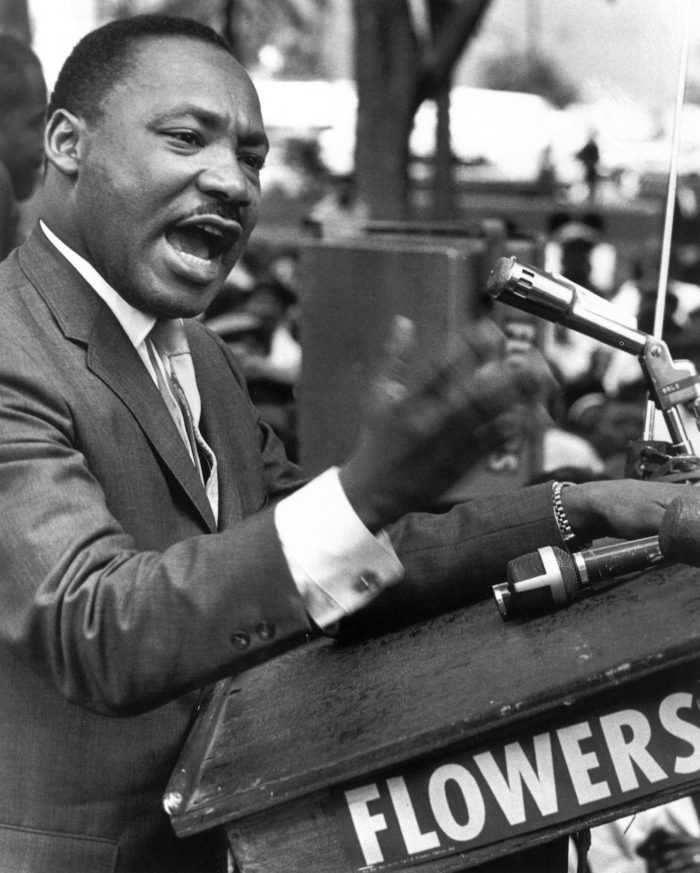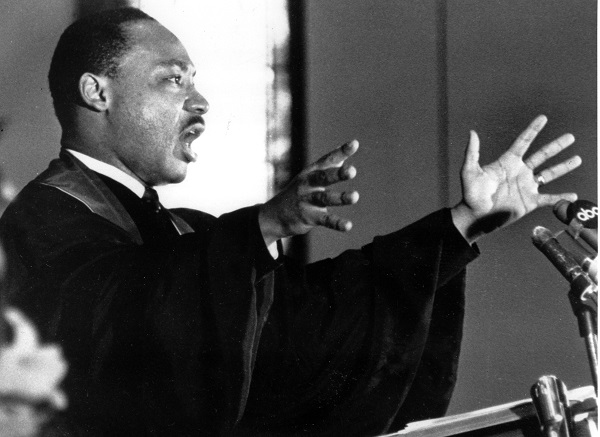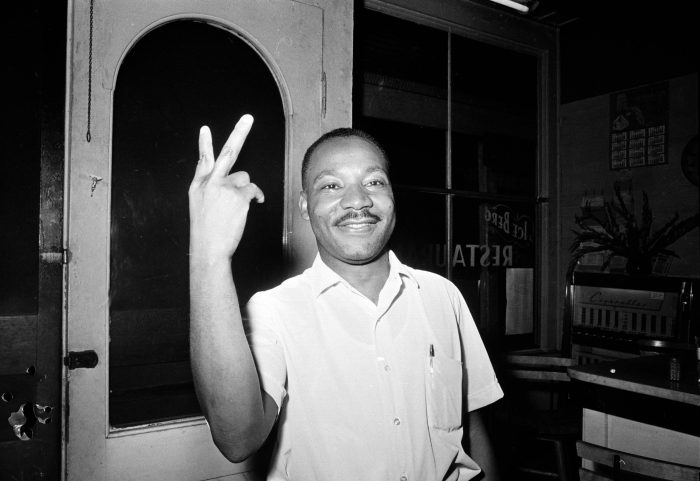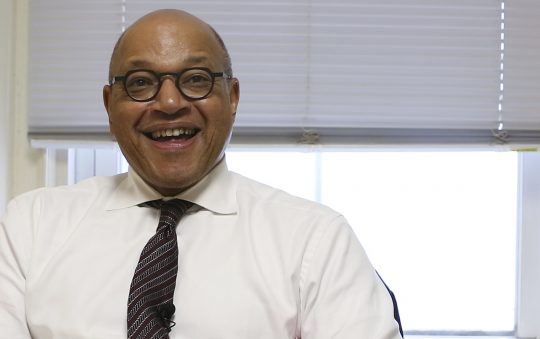
From pulpits in the sanctuary to the steps of the Lincoln Memorial in Washington D.C., Rev. Dr. Martin Luther King Jr. has delivered a plethora of historical speeches that have impacted humanity and brought about change, not only for Blacks but people of all races, ethnicities, and genders.
As a great orator, he was able to move, encourage, and touch the hearts of many political leaders, figures, and people around the world with just one word. This week, we honor his legacy as a prominent spokesperson and leader of the Civil Rights Movement, by looking back at a few excerpts from some of Dr. King’s most unforgettable speeches.

The Infamous “I have a Dream Speech” was delivered during the March on Washington on August 28, 1963.
I say to you today, my friends, that in spite of the difficulties and frustrations of the moment, I still have a dream. It is a dream deeply rooted in the American dream.
I have a dream that one day this nation will rise up and live out the true meaning of its creed: “We hold these truths to be self-evident: that all men are created equal.”
I have a dream that one day on the red hills of Georgia the sons of former slaves and the sons of former slave owners will be able to sit down together at a table of brotherhood.
I have a dream that one day even the state of Mississippi, a desert state, sweltering with the heat of injustice and oppression, will be transformed into an oasis of freedom and justice.
I have a dream that my four children will one day live in a nation where they will not be judged by the color of their skin but by the content of their character.
I have a dream today.
I have a dream that one day the state of Alabama, whose governor’s lips are presently dripping with the words of interposition and nullification, will be transformed into a situation where little black boys and black girls will be able to join hands with little white boys and white girls and walk together as sisters and brothers.
I have a dream today.
I have a dream that one day every valley shall be exalted, every hill and mountain shall be made low, the rough places will be made plain, and the crooked places will be made straight, and the glory of the Lord shall be revealed, and all flesh shall see it together.
This is our hope. This is the faith with which I return to the South. With this faith we will be able to hew out of the mountain of despair a stone of hope. With this faith we will be able to transform the jangling discords of our nation into a beautiful symphony of brotherhood. With this faith we will be able to work together, to pray together, to struggle together, to go to jail together, to stand up for freedom together, knowing that we will be free one day.
This will be the day when all of God’s children will be able to sing with a new meaning, “My country, ’tis of thee, sweet land of liberty, of thee I sing. Land where my fathers died, land of the pilgrim’s pride, from every mountainside, let freedom ring.”
And if America is to be a great nation this must become true. So let freedom ring from the prodigious hilltops of New Hampshire. Let freedom ring from the mighty mountains of New York. Let freedom ring from the heightening Alleghenies of Pennsylvania!
Let freedom ring from the snowcapped Rockies of Colorado!
Let freedom ring from the curvaceous peaks of California!
But not only that; let freedom ring from Stone Mountain of Georgia!
Let freedom ring from Lookout Mountain of Tennessee!
Let freedom ring from every hill and every molehill of Mississippi. From every mountainside, let freedom ring.
When we let freedom ring, when we let it ring from every village and every hamlet, from every state and every city, we will be able to speed up that day when all of God’s children, black men and white men, Jews and Gentiles, Protestants and Catholics, will be able to join hands and sing in the words of the old Negro spiritual, “Free at last! free at last! thank God Almighty, we are free at last!”
The “Eulogy for the Young Victims of the Sixteenth Street Baptist Church Bombing” was delivered on September 18, 1963, at Sixteenth Street Baptist Church, Birmingham, Alabama, during the funeral service for three of the children who were killed in the bombing.

This afternoon we gather in the quiet of this sanctuary to pay our last tribute of respect to these beautiful children of God. They entered the stage of history just a few years ago, and in the brief years that they were privileged to act on this mortal stage, they played their parts exceedingly well. Now the curtain falls; they move through the exit; the drama of their earthly life comes to a close. They are now committed back to that eternity from which they came.
These children-unoffending, innocent, and beautiful-were the victims of one of the most vicious and tragic crimes ever perpetrated against humanity.
And yet they died nobly. They are the martyred heroines of a holy crusade for freedom and human dignity. And so this afternoon in a real sense they have something to say to each of us in their death. They have something to say to every minister of the gospel who has remained silent behind the safe security of stained-glass windows. They have something to say to every politician [Audience:] (Yeah) who has fed his constituents with the stale bread of hatred and the spoiled meat of racism. They have something to say to a federal government that has compromised with the undemocratic practices of southern Dixie-crats (Yeah) and the blatant hypocrisy of right-wing northern Republicans. (Speak) They have something to say to every Negro (Yeah) who has passively accepted the evil system of segregation and who has stood on the sidelines in a mighty struggle for justice. They say to each of us, black and white alike, that we must substitute courage for caution. They say to us that we must be concerned not merely about who murdered them, but about the system, the way of life, the philosophy which produced the murderers. Their death says to us that we must work passionately and unrelentingly for the realization of the American dream.
Now I say to you in conclusion, life is hard, at times as hard as crucible steel. It has its bleak and difficult moments. Like the ever-flowing waters of the river, life has its moments of drought and its moments of flood. (Yeah, Yes) Like the ever-changing cycle of the seasons, life has the soothing warmth of its summers and the piercing chill of its winters. (Yeah) And if one will hold on, he will discover that God walks with him (Yeah, Well), and that God is able (Yeah, Yes) to lift you from the fatigue of despair to the buoyancy of hope, and transform dark and desolate valleys into sunlit paths of inner peace.
And so today, you do not walk alone. You gave to this world wonderful children. [moans] They didn’t live long lives, but they lived meaningful lives. (Well) Their lives were distressingly small in quantity, but glowingly large in quality. (Yeah) And no greater tribute can be paid to you as parents, and no greater epitaph can come to them as children, than where they died and what they were doing when they died. (Yeah) They did not die in the dives and dens of Birmingham (Yeah, Well), nor did they die discussing and listening to filthy jokes. (Yeah) They died between the sacred walls of the church of God (Yeah, Yes), and they were discussing the eternal meaning (Yes) of love. This stands out as a beautiful, beautiful thing for all generations. (Yes) Shakespeare had Horatio to say some beautiful words as he stood over the dead body of Hamlet. And today, as I stand over the remains of these beautiful, darling girls, I paraphrase the words of Shakespeare: (Yeah, Well): Good night, sweet princesses. Good night, those who symbolize a new day. (Yeah, Yes) And may the flight of angels (That’s right) take thee to thy eternal rest. God bless you.
Dr. King delivered his final speech, “I’ve Been To the Mountain Top,” on the eve of his assassination at the Mason Temple in Memphis, Tennessee, on April 3, 1968. The temple is the headquarters of the Church of God in Christ, the largest African American Pentecostal denomination in the United States.

I’m delighted to see each of you here tonight in spite of a storm warning. You reveal that you are determined to go on anyhow. Something is happening in Memphis, something is happening in our world.
We need all of you. And you know what’s beautiful to me, is to see all of these ministers of the Gospel. It’s a marvelous picture. Who is it that is supposed to articulate the longings and aspirations of the people more than the preacher? Somehow the preacher must be an Amos, and say, “Let justice roll down like waters and righteousness like a mighty stream.” Somehow, the preacher must say with Jesus, “The spirit of the Lord is upon me, because he hath anointed me to deal with the problems of the poor.”
Let us develop a kind of dangerous unselfishness. One day a man came to Jesus; and he wanted to raise some questions about some vital matters in life. At points, he wanted to trick Jesus, and show him that he knew a little more than Jesus knew, and through this, throw him off base. Now that question could have easily ended up in a philosophical and theological debate. But Jesus immediately pulled that question from mid-air, and placed it on a dangerous curve between Jerusalem and Jericho. And he talked about a certain man, who fell among thieves. You remember that a Levite and a priest passed by on the other side. They didn’t stop to help him. And finally a man of another race came by. He got down from his beast, decided not to be compassionate by proxy. But with him, administered first aid, and helped the man in need. Jesus ended up saying, this was the good man, because he had the capacity to project the “I” into the “thou,” and to be concerned about his brother. Now you know, we use our imagination a great deal to try to determine why the priest and the Levite didn’t stop. At times we say they were busy going to church meetings–an ecclesiastical gathering–and they had to get on down to Jerusalem so they wouldn’t be late for their meeting. At other times we would speculate that there was a religious law that “One who was engaged in religious ceremonials was not to touch a human body twenty-four hours before the ceremony.” And every now and then we begin to wonder whether maybe they were not going down to Jerusalem, or down to Jericho, rather to organize a “Jericho Road Improvement Association.” That’s a possibility. Maybe they felt that it was better to deal with the problem from the casual root, rather than to get bogged down with an individual effort.
Let us rise up tonight with a greater readiness. Let us stand with a greater determination. And let us move on in these powerful days, these days of challenge to make America what it ought to be. We have an opportunity to make America a better nation. And I want to thank God, once more, for allowing me to be here with you.
Well, I don’t know what will happen now. We’ve got some difficult days ahead. But it doesn’t matter with me now. Because I’ve been to the mountaintop. And I don’t mind. Like anybody, I would like to live a long life. Longevity has its place. But I’m not concerned about that now. I just want to do God’s will. And He’s allowed me to go up to the mountain. And I’ve looked over. And I’ve seen the Promised Land. I may not get there with you. But I want you to know tonight, that we, as a people will get to the Promised Land. And I’m happy, tonight. I’m not worried about anything. I’m not fearing any man. Mine eyes have seen the glory of the coming of the Lord.
Dr. King dedicated his life to fighting for injustices and racial equality. Today, his legacy is carried out through current organizations and individuals who are fighting for freedom and justice in his honor.








